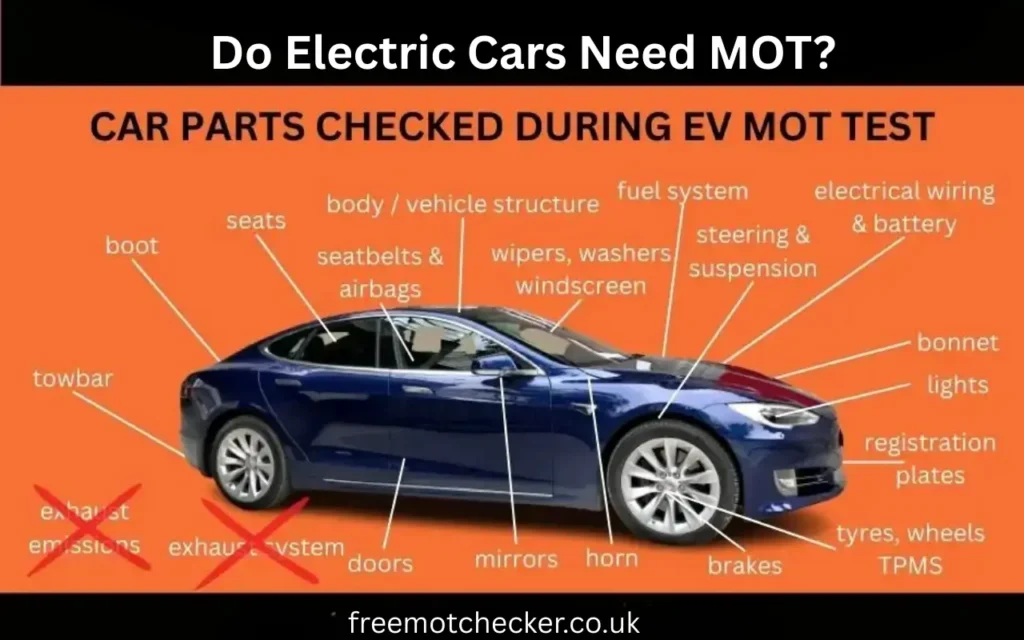If you own an electric car, you might wonder whether it still needs an MOT. The short answer is yes. Even though electric vehicles don’t have petrol engines or exhausts, they still need regular checks to make sure they are safe, roadworthy, and legally compliant. Skipping an MOT can lead to fines, insurance problems, and hidden safety risks.
In this article, we will break down exactly what MOT means for electric cars, what inspectors look for, and how you can keep your vehicle in top shape. By the end, you will know everything you need to ensure your electric car passes its MOT without surprises.
What is an MOT?
An MOT is a yearly test that checks if your car is safe to drive on public roads. It looks at important parts like brakes, lights, tires, steering, and seatbelts. Think of it as a health check for your vehicle. Just like you go for a regular check-up to make sure your body is fine, an MOT ensures your car is fit for the road.
Instantly find your Car’s MOT History Online
The main goal of an MOT is to keep drivers, passengers, and other road users safe. Cars that fail an MOT can be dangerous or illegal to drive. Every car over three years old must have a valid MOT to meet the law. This applies to electric cars as well, even though they don’t have traditional engines or exhaust systems.
Do Electric Cars Require an MOT?

Yes, electric cars require an MOT, just like petrol or diesel cars. The law doesn’t make exceptions for electric vehicles, even though they don’t produce exhaust emissions.
For electric cars, the rules are the same: any car over three years old must have a valid MOT. Cars under three years generally do not need an MOT, but it’s still important to keep them well-maintained. Regular maintenance ensures safety and prevents unexpected problems when the car eventually reaches its MOT age.
What Do Inspectors Check in Electric Cars?
During an MOT, inspectors check both standard safety features and electric-specific components. If you are unsure about how to prepare your car for MOT, read this guide. Here’s what they look at:

- Brakes and Tires: The condition of brakes and tires is critical. Worn brakes or bald tires can cause accidents. Inspectors check that brakes respond correctly and tires have enough tread.
- Lights and Indicators: Headlights, brake lights, and turn signals must work properly. Even a small fault can affect safety and cause the car to fail the MOT.
- Steering and Suspension: Inspectors make sure the car handles well and that the steering isn’t loose or uneven. Suspension parts are checked for damage or wear.
- Seatbelts and Safety Systems: Seatbelts, airbags, and other safety features are tested to ensure they function as intended.
- Electric Components: For electric cars, battery health, high-voltage wiring, and charging ports are inspected. This ensures there are no risks of short circuits or battery faults.
- Body and Chassis: The car’s frame and bodywork are checked for rust or damage that could affect safety.
Even though electric cars don’t have exhaust systems or traditional engines, these checks make sure every part of the vehicle is safe and roadworthy.
Common Misconceptions About MOT for Electric Cars
Many people believe electric cars don’t need an MOT, but this is not true. Here are some common myths and the real facts:
Myth 1: Electric cars are too new to need MOT.
Even though electric cars often have fewer mechanical parts, any car over three years old must have an MOT. The law treats electric cars the same as petrol or diesel vehicles.
Myth 2: Batteries replace all mechanical checks.
A healthy battery is important, but it doesn’t cover brakes, lights, tires, or steering. MOT inspections still check these systems to make sure the car is safe to drive.
Myth 3: Silent cars are automatically safer.
Electric cars are quiet, but low noise doesn’t guarantee safety. Mechanical and electrical systems must be tested to prevent accidents.
Myth 4: MOT is unnecessary for electric cars because they are eco-friendly.
While electric cars produce fewer emissions, safety remains the priority. MOT ensures every part of the car works properly, regardless of its environmental impact.
Understanding these misconceptions helps owners stay compliant and avoid penalties while keeping their vehicles safe.
Also Read: Why MOT checks are crucial for PCO drivers?
Consequences of Skipping MOT
Skipping an MOT can lead to serious legal and safety issues.
- Legal Penalties: Driving without a valid MOT is illegal. You could face fines of up to £1,000, points on your license, or even prosecution if the car is unsafe.
- Insurance Problems: If your electric car is involved in an accident without a valid MOT, your insurance may not cover the damages. This can leave you paying repair costs out of pocket.
- Safety Risks: MOT checks identify problems like worn brakes, faulty lights, or battery issues. Skipping the test increases the chance of accidents or breakdowns.
- Unexpected Costs: Small issues discovered during MOT can be fixed early. Ignoring them can lead to larger, more expensive repairs later.
Even though electric cars have fewer moving parts, regular MOT checks protect you, your passengers, and others on the road.
Conclusion
Electric cars do need an MOT, just like traditional petrol or diesel vehicles. The test ensures your car’s brakes, lights, tires, steering, and electrical systems are safe and roadworthy. By keeping up with regular checks and maintenance, you protect yourself, your passengers, and other road users. Scheduling your MOT on time avoids fines, insurance issues, and unexpected repairs.
FAQs
Do brand new electric cars need an MOT?
No, electric cars under three years old do not require an MOT. However, it’s still important to maintain the vehicle properly.
Are MOT checks different for electric vs petrol cars?
The basic safety checks are the same. Electric cars also have additional checks for batteries, high-voltage components, and charging systems.
Can I fail MOT because of battery issues?
Yes, if the battery or charging system has serious faults that affect safety or roadworthiness, it can cause a failure.







